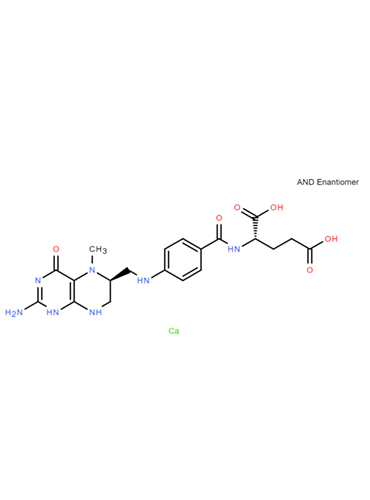Our Products
L-5-Methyltetrahydrofolate
/
Nutrition
/
Product
/
Home
Current Location:


Deficiency
Calcium L-5-Methyltetrahydrofolate (L-5-MTHF)
MF: C20H27CaN7O6
CAS : 151533-22-1
Features:
Our pharmaceutical-grade L-5-MTHF is manufactured in a GMP-certified production process with state-of-the-art crystallization technology. Our product possesses high stability and a purity over 99.9%.
Description:
Folate is critical to many cellular processes, including DNA synthesis, cell division, and conversion of homocysteine to methionine. It is especially important during periods of frequent cell division and growth, such as infancy and pregnancy. Causes of folate deficiency include poor diet, pregnancy, alcoholism, liver diseases, gut problems, impaired kidney function, and MTHFR gene mutations.
Calcium L-5-MTHF, or calcium levomefolate, is a coenzymated calcium salt of vitamin B9 (folate or folic acid). L-5-MTHF is the most bioavailable form of folate supplements. It is easier to absorb and metabolize than other folate forms. It is also the only species found in circulation and transported across membranes & the blood–brain barrier.
L-5-MTHF supplementation has several advantages over intake of folic acid. First, it is less likely to mask vitamin B12 (cobalamin) deficiency symptoms. Second, L-5-MTHF is associated with a reduced interaction with drugs that inhibit dihydrofolate reductase. Finally, L-5-MTHF absorption is not affected by MTHFR gene polymorphism.
Application:
Dietary supplementation of folate utilizes its neuro-protective, cardio-protective, antidepressive, and anti-neoplastic effects. Folic acid fortification of grain products is required in some countries to prevent neural tube defects of the newborns. Along with vitamin B12, folate is also found to reduce the blood homocysteine level, which is associated with elevated stroke and heart attack risks.
Folate deficiency causes impaired cell metabolism and proliferation. Manifestations include:
1. Megaloblastic anemia: decreased number of red blood cells (but larger-than-normal in size);
2. Leukopenia: compromised immune functions;
3. Increased risks of certain cancers: might be caused by malfunction in DNA synthesis and repair;
4. Neuropsychiatric impairment: such as Alzheimer’s disease, Parkinson disease, and depression;
5. Hyperhomocysteinemia: associated with increased stroke and heart attack risks;
6. Unfavorable pregnancy outcomes: neural tube defects, cleft palate/lips, preterm birth, etc.
